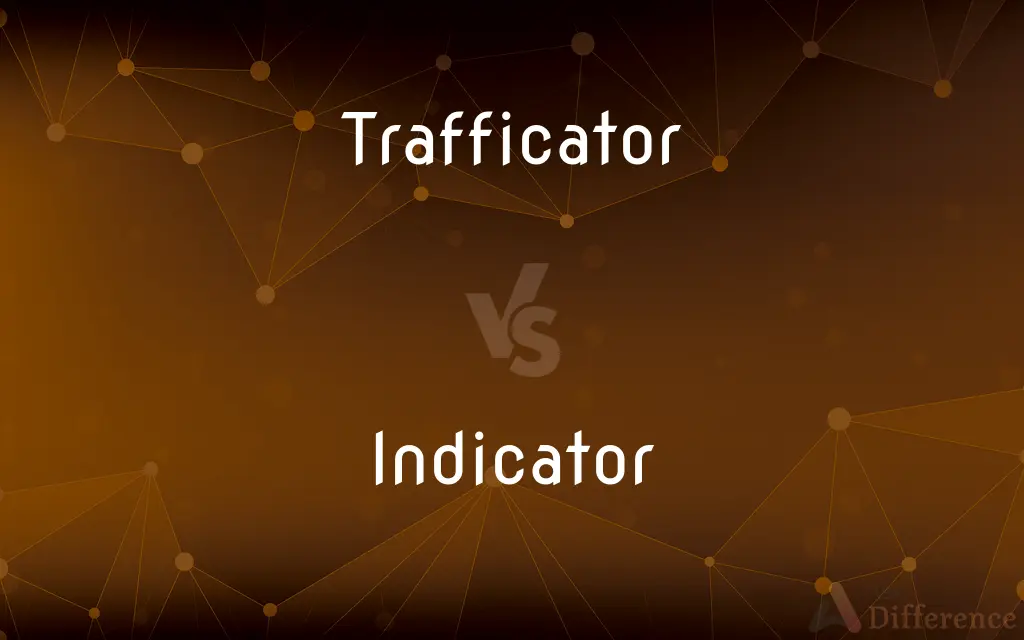Trafficator vs. Indicator — What's the Difference?
By Tayyaba Rehman — Updated on November 4, 2023
Trafficator is an older term for a vehicle's signal arm, while Indicator is the modern term for a vehicle's blinker or signal light.

Difference Between Trafficator and Indicator
Table of Contents
ADVERTISEMENT
Key Differences
A trafficator is an electromechanical device that was commonly found on automobiles, typically used from the 1930s to the 1950s. It signaled a vehicle’s intent to turn by extending an arm out of the side of the car. An indicator is an electric light that blinks to show the direction a vehicle is about to turn and is found on all modern vehicles.
Trafficators are now considered a piece of motoring history and are mostly found on vintage or classic cars. They are often sought after by classic car enthusiasts. Indicators, however, are a standard safety feature on vehicles, required by law in most places, and serve the same purpose as a modern evolution of the trafficator.
The use of the word "trafficator" is mainly restricted to the United Kingdom and countries influenced by British English. On the other hand, the term "indicator" is widely understood and used across the world to refer to the blinking signal lights on a vehicle.
Trafficators, being older technology, were manually operated and prone to mechanical failure. Modern indicators are electronically operated, more reliable, and are integrated into the vehicle's lighting system. They are activated by a lever usually located on the steering column.
While the purpose of both a trafficator and an indicator is to signal the intention to turn, the design, operation, and prevalence of the two are distinct. Trafficator arms would physically pop out of the side of the vehicle, whereas indicators use flashing lights to signal the intent to other drivers.
ADVERTISEMENT
Comparison Chart
Era of Use
1930s to 1950s
Modern day
Type of Signal
Mechanical arm extends from vehicle
Electric light blinks on vehicle
Operation
Manually operated
Electronically operated
Prevalence
Found on vintage/classic cars
Found on all modern vehicles
Terminology Usage
Mainly British English
Universally understood and used
Compare with Definitions
Trafficator
Manually operated turn signal.
He had to manually operate the trafficator due to the old mechanism.
Indicator
A key safety feature on vehicles.
His car's indicator was bright and visible even in fog.
Trafficator
A signaling device on old cars.
The vintage car had its trafficator pop out as it turned.
Indicator
Universal in modern transportation.
Regulations require that every motor vehicle be equipped with an indicator.
Trafficator
Pioneered vehicle turn signaling.
The museum's exhibit on the evolution of car technology featured a working trafficator.
Indicator
A vehicle's blinker light.
She signaled with her indicator before changing lanes.
Trafficator
Extends to indicate turning.
He checked to ensure the trafficator was functioning before the drive.
Indicator
Used for signaling turns.
The driver activated the indicator to show he was turning right.
Trafficator
Often found on classic vehicles.
The trafficator on her 1950s car still worked perfectly.
Indicator
Operated by an electronic switch.
The indicator switch on her steering column was intuitive to use.
Trafficator
An obsolete kind of signalling device on the side of a motor vehicle, having the form of a small illuminated pointer which could be extended to indicate a change of direction.
Indicator
A thing that indicates the state or level of something
Car ownership is frequently used as an indicator of affluence
Trafficator
(automotive) A blinking light on a motor vehicle that indicates the direction in which it is about to turn.
Indicator
A gauge or meter of a specified kind
An altitude indicator
A speed indicator
Trafficator
(historical) A semaphore device with a steady light that served the same purpose on early vehicles.
Indicator
A compound that changes colour at a specific pH value or in the presence of a particular substance, and can be used to monitor acidity, alkalinity, or the progress of a reaction
The remaining alkali is titrated against standard acid using phenolphthalein as indicator
Trafficator
A blinking light on a motor vehicle that indicates the direction in which the vehicle is about to turn
Indicator
A pointer or an index.
Indicator
An instrument used to monitor the operation or condition of an engine, furnace, electrical network, reservoir, or other physical system; a meter or gauge.
Indicator
The needle, dial, or other registering device on such an instrument.
Indicator
(Chemistry) Any of various substances, such as litmus or phenolphthalein, that indicate the presence, absence, or concentration of another substance or the degree of reaction between two or more substances by means of a characteristic change, especially in color.
Indicator
(Ecology) An indicator species.
Indicator
Any of various statistical values that together provide an indication of the condition or direction of the economy.
Indicator
A pointer or index that indicates something.
Indicator
A meter or gauge.
Indicator
The needle or dial on such a meter.
Indicator
(chemistry) Any of many substances, such as litmus, used to indicate the concentration of a substance, or the degree of a reaction.
Indicator
(ecology) A plant or animal whose presence is indicative of some specific environment.
Indicator
(economics) A measure, such as unemployment rate, which can be used to predict economic trends.
Indicator
A turn signal; each of the flashing lights on each side of a vehicle which indicate a turn is being made to left or right, or a lane change etc.
Indicator
A bird, the honeyguide.
Indicator
One who, or that which, shows or points out; as, a fare indicator in a street car.
Indicator
A pressure gauge; a water gauge, as for a steam boiler; an apparatus or instrument for showing the working of a machine or moving part
Indicator
The part of an instrument by which an effect is indicated, as an index or pointer.
Indicator
Any bird of the genus Indicator and allied genera. See Honey guide, under Honey.
Indicator
That which indicates the condition of acidity, alkalinity, or the deficiency, excess, or sufficiency of a standard reagent, by causing an appearance, disappearance, or change of color, as in titration or volumetric analysis.
Indicator
A number or ratio (a value on a scale of measurement) derived from a series of observed facts; can reveal relative changes as a function of time
Indicator
A signal for attracting attention
Indicator
A device for showing the operating condition of some system
Indicator
(chemistry) a substance that changes color to indicate the presence of some ion or substance; can be used to indicate the completion of a chemical reaction or (in medicine) to test for a particular reaction
Common Curiosities
What does an indicator do?
An indicator is a light on a vehicle that blinks to show turning intention.
Is an indicator a legal requirement?
Yes, indicators are legally required on vehicles for road safety.
Do trafficators use lights?
No, they physically extend out from the car to signal.
Are trafficators still in use?
Trafficators are mostly found on vintage cars and are not common today.
What if my trafficator or indicator fails?
It should be repaired immediately as it's essential for safety.
Are there any cars that have both trafficators and indicators?
Some classic cars might have been retrofitted with both.
What is a trafficator?
A trafficator is an old-fashioned signaling arm on a vehicle, indicating turns.
Can you find a trafficator on modern cars?
No, modern cars have indicators, not trafficators.
Why were trafficators replaced by indicators?
Indicators are more reliable, visible, and easier to operate.
Can indicators be on both the front and rear of a vehicle?
Yes, indicators are found on both the front and rear.
How do you operate an indicator?
By using a lever or switch on the steering column.
Are indicators reliable?
Yes, modern indicators are reliable and electronically operated.
Do all vehicles have indicators?
Yes, all modern vehicles are equipped with indicators.
Are trafficators part of vehicle inspections for classic cars?
Yes, if the car originally came with trafficators, they are inspected.
What happens when an indicator's light burns out?
It should be replaced immediately to maintain safety.
Share Your Discovery

Previous Comparison
Statutory vs. Mandatory
Next Comparison
Vaguery vs. VagueAuthor Spotlight
Written by
Tayyaba RehmanTayyaba Rehman is a distinguished writer, currently serving as a primary contributor to askdifference.com. As a researcher in semantics and etymology, Tayyaba's passion for the complexity of languages and their distinctions has found a perfect home on the platform. Tayyaba delves into the intricacies of language, distinguishing between commonly confused words and phrases, thereby providing clarity for readers worldwide.















































